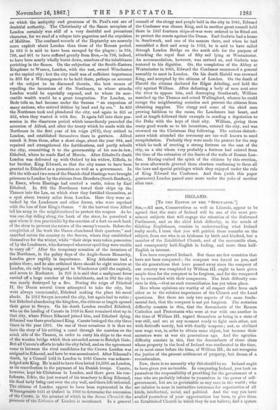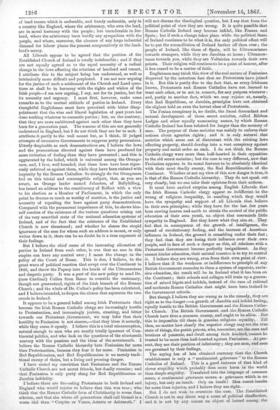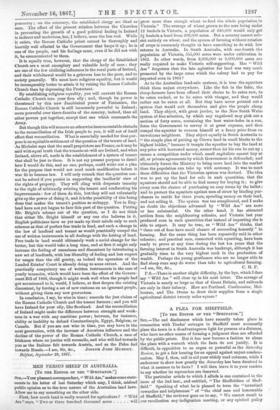IRELAND.
[To THE EDITOR OF THE "SPECTATOR."] SIR,-All men, Conservatives as well as Liberals, appear to be agreed that the state of Ireland will be one of the most pro- minent subjects that will engage the attention of the Reformed Parliament, and as the chief Irish difficulty, in the minds of thinking Englishmen, consists in understanding what Ireland really needs, I trust that you will publish these remarks on the subject, from one who is an Irishman by birth and kindred, but a member of the Established Church, and of the mercantile class, and consequently half-English in feeling, and more than half- English in interest.
You have conquered Ireland. But there are few countries that have not been conquered ; the conquest was forced on you, and the six generations that have passed away since the conquest of our country was completed by William III. ought to have given ample time for the conquest to be forgiven, and for the conquered to be reconciled with their conquerors. The Irish difficulty con- sists in this,—that no such reconciliation has yet taken place.
Men whose opinions are worthy of all respect differ from each other as to the relative importance of the Church and the Land questions. But these are only two aspects of the same funda- mental fact, that the conquest is not yet forgiven. The sectarian difficulty consists in this, that the descendants of the Roman Catholics and Protestants who were at war with one another in the time of William HI. regard themselves as being in a state of war still, and are at any moment ready to fight each other, not with fisticuffs merely, but with deadly weapons ; not, as civilized men wage war, in order to obtain some object, but because their ancestors were at war six generations ago. And the agrarian difficulty consists in this, that the descendants of those clans whose property in the land of Ireland was confiscated in the time, or in most cases before the time, of William Ill., do not recognize the justice of the present settlement of property, but dream of a reeonfiscation.
Now, there is no necessity why this should be so. Ireland ought to have given you no trouble. In conquering Ireland, you took on yourselves the responsibility of providing for the government of a race who are probably inferior to yourselves in the power of self- government, but are as governable as any race in the world ; who are inferior to none in instinctive reverence for superiorities of all kinds, intellectual, social, and political. And the way you have availed yourselves of your opportunities has been, to give them an Established Church in which they do not believe, and a system of land tenure which is endurable, and barely endurable, only in a country like England, where the aristocracy, who own the land,
are in moral harmony with the people ; but unendurable in Ire- land, where the aristocracy have hardly any sympathies with the people, and where, moreover, the absence of any large industrial demand for labour places the peasant comparatively at the land- lord's mercy.
All Liberals appear to be agreed that the position of the Established Church of Ireland is totally indefensible ; and if they
are not equally agreed as to the equal necessity of a radical change in the laws affecting the relations of landlord and tenant, I attribute this to the subject being less understood, as well as
intrinsically more difficult and perplexed. I am not now arguing for the justice of such a settlement of the Church and Land ques- tions as shall be in harmony with the rights and wishes of the
Irish people—I am now arguing, I say, not for its justice, but for its necessity and urgency. I must first, however, make some remarks as to the mutual attitude of parties in Ireland. Every thoughtful Englishman must have perceived with bitter disap- pointment that the wise and liberal legislation of past years has done nothing whatever to reconcile parties ; but, on the contrary, that they are more embittered against each other than they have been for a generation past. The reasons of this are not generally understood in England, but I do not think they are far to seek. I attribute it partly to the well meant but, as I think, ill judged attempts of successive Governments to suppress party. processions. Utterly despicable as such demonstrations are, I believe the laws and the prosecutions directed against them have produced far more irritation of feeling than they have prevented ; and this is aggravated by the belief, which is universal among the Orange- men, and, I fear, well founded, that those laws have been rigor- ously enforced as against them, while they Aare been violated with impunity by the Roman Catholics. So strongly do the Orangemen feel on this trivial and contemptible subject, that, as you are aware, an Orange leader named Johnston, of Ballykilbeg, has issued an address to the constituency of Belfast with a view to his election as a Member of Parliament, in which the only point he dreams so much as worthy of mention, is the justice and necessity of repealing the laws against party demonstrations. Compared with the paramount importance of this, he shows him- self careless of the existence of the various questions arising out of the very unsettled state of the national education systems of Ireland, and of the fact that the existence of the Established Church is now threatened; and whether he shares the stupid ignorance of the men for whom such an address is meant, or only writes down to it, there can be no doubt he is a true exponent of their feelings.
But I believe the chief cause of the increasing alienation of parties in Ireland from each other, is one that no one in this empire can have any control over ; I mean the change in the policy of the Court of Rome. This is due, I believe, to the great wave of political reaction that swept over the Continent in 1849, and threw the Papacy into the hands of the Ultrarnontane and despotic party. It was a part of the new policy to send Dr. (now Cardinal) Cullen from Rome to override the customary, though not guaranteed, rights of the Irish branch of the Roman Church ; and the whole of Dr. Cullen's policy has been calculated, and I believe intended, to deepen the chasm that separates the two creeds in Ireland.
It appears to be a general belief among Irish Protestants that because the Irish Roman Catholic clergy are increasingly hostile to Protestantism, and increasingly jealous, exacting, and bitter towards our Protestant .Government, we may infer that their hostility to Fenianism is not sincere,—that they bless it secretly, while they curse it openly. I believe this is a total misconception, natural enough to men who are mostly totally ignorant of Con- tinental politics, and who look on the questions of the nineteenth century with the passions and the ideas of the seventeenth. I believe the Roman Catholic hierarchy hate Fenianism far more than Protestantism, because they fear it far more. Fenianism is Red Republicanism, and Red Republicanism is no merely tradi- tional enemy of theirs, but a living and pressing danger.
I have stated my conviction that Fenianism and the Roman Catholic Church are not secret friends, but deadly enemies ; and
• that Fenianism is only party slang for Red Republicanism or Jacobin infidelity.
I believe there are fire-eating Protestants in both Ireland and England who would rejoice to believe that this was true ; who think that the Roman Catholic form of Christianity is worse than atheism, and that she whom all generations shall call blessed is a i worse idol than " Cotytto or Venus, Astarte or Ashtaroth." I
will not discuss the theological question, but I say that from the political point of view they are wrong. It is quite possible that Roman Catholic Ireland may become infidel, like France and Spain ; but if such a change takes place while the political State of Ireland continues to be what it is, the only political effect will be to put the reconciliation of Ireland farther off than ever ; the people of Ireland, like those of Spain, will be Ultramontanes towards strangers, while they are Jacobins at home ; Ultramon- tanes towards you, while they are Voltairian towards their own priests. Their religion will continue to be a point of honour, after it has ceased to be a matter of faith.
Englishmen may think this view of the real nature of Fenianism disproved by the notorious fact that no Protestants have joined in it. But this is partly due to the fact that, as every Irishman knows, Protestants and Roman Catholics have not learned to trust each other, or to act in concert, for any purpose whatever : and, partly to another fact, which we may rejoice at, namely, that Red Republican, or Jacobin, principles have not obtained the slighest hold on even the lowest class of Protestants.
The Fenian conspiracy is, no doubt, the lineal descendant and natural development of those secret societies, called Ribbon Lodges and other equally unmeaning names, by which Roman Catholic Ireland has been infested for longer than the memory of man. The purpose of those societies was mainly to enforce their notions about agrarian sights; and it is only natural that societies which arose out of discontent with the existing laws affecting property, should develop into a vast conspiracy against property and social order as such. I do not think the Roman Catholic clergy were more than half-hearted in their opposition to the old secret societies ; but the case is very different, now that Fenianism appears in its moral features to be absolutely identical with their most deadly enemy, the Red Republicanism of the Continent. Whether or not my view of this new danger is true, it is that of the Roman Catholic hierarchy. They do not speak out very clearly, but we can infer their opinions from their actions. lt must have excited surprise among English Liberals that the Irish Roman Catholic clergy appear so indifferent to the wrong of religious inequality, in assailing which they would have the sympathy and support of all Liberals that believe in their own principles ; while they have for the last few years been moving heaven and earth to obtain the control of the public education of their own youth, an object that commands little sympathy in England. But they know what they aim at. They feel that in consequence of the growth of intelligence, the spread of revolutionary feeling, and the increase of American influence in Ireland, the ground is crumbling under their feet ; they feel that they are losing their influence over their own people, and in face of such a danger as this, all relations with a Protestant Government become perfectly insignificant. As they cannot hinder education, their natural resource is to try to control it. I believe they are wrong, even from their own point of view. I believe that if the weakness or indifference to principle of any British Government concedes to them a system of separate, exclu- sive education, the result will be in Ireland what it has been on the Continent ; their schools and colleges will train up a genera- tion of mixed bigots and infidels, instead of the race of rational and moderate Roman Catholics that might have been trained in the Government schools. .
But though I believe they are wrong as to the remedy, they are right as to the danger :—a growth of Jacobin and infidel feeling, equally hostile to the British Government and the Roman Catho- lic Church. The British Government and the Roman Catholic Church have thus a common enemy, and ought to be allies. But this is impossible till there is genuine religious equality. Till then, no matter how clearly the superior clergy may see the true state of things, the parish priests, who, remember, are the sons and brothers of peasants, and dwell among their kindred, cannot be trusted to be more than half-hearted against Fenianism. At pre- sent, they see their position of inferiority ; they are men, and men are governed by their feelings.
The saying has of late obtained currency that the Church establishment is only a "sentimental grievance" to the Roman Catholics of Ireland. This is a good instance of that kind of clever stupidity which probably does more harm in the world than simple stupidity. Translated into the language of common sense, a sentimental grievance means a grievance which is no
injury, but only an insult. Only an insult ! Men resent insults far more than injuries, and I believe they are right.
But I do not wish to overstate the case. The Established Church is not in any direct way a cause of political disaffection, and it is not by any means an object of hatred among the
peasantry ; on the contrary, the established clergy are liked as men. The effect of the present relation between the Churches in preventing the growth of a good political feeling in Ireland is indirect and unobvious, but, I believe, none the less real. While it exists, the Roman Catholic priest cannot be thoroughly and heartily well affected to the Government that keeps it up ; he is one of the people, and his feelings must, even if he did not wish it, be communicated to them.
It is equally true, however, that the clergy of the Established Church are a most exemplary and valuable body of men ; they are one of the few civilizing influences in the rural parts of Ireland, and their withdrawal would be a grievous loss to the poor, and to society generally. We must have religious equality, but it would be incomparably better to attain it by raising the Roman Catholic Church than by depressing the Protestant.
By establishing religious equality, you will convert the Roman Catholic Church into your firm ally ; and, though its power is threatened by this new Jacobinical power of Fenianiam, the Roman Catholic Church is still immensely powerful in Ireland ; more powerful over three-fourths of the country, indeed, than all other powers put together, except that one which commands the Army.
But though this will remove an otherwise insurmountable obstacle to the reconciliation of the Irish people to you, it will not of itself effect that reconciliation. What is essentially needed for that pur- pose is an equitable settlement of the question of the tenure of land. As Michelet says that the small proprietors are France, so it may be said with equal truth that the tenants-at-will are Ireland, and what Ireland, above all, needs is the establishment of a system of tenure that shall be just to them. It is not my present purpose to detail how I would do this, and no one, perhaps, could write out a plan for the purpose that would not need much modification before it was fit to become law. I will only remark that the question can- not be solved if you persist in supporting the landlords' view of the rights of property. They will cling with desperate tenacity to the right of arbitrarily evicting the tenant and confiscating his improvements : few of them do this, but they will not voluntarily give up the power of doing it, and it is the possibility of this being done that makes the tenant's position so unhappy. You in Eng- land have not yet begun to face this part of the question. Putting Mr. Bright's scheme out of the question, as I do not think that either Mr. Bright himself or any one else believes in it, English politicians have as yet made up their minds only to such schemes as that of perfect free trade in land, and such a change in the law of landlord and tenant as would practically compel the use of written instruments in all dealings with the letting of land. Free trade in land would ultimately work a social change for the better, but this would take a long time, and at first it might only increase the feeling of uneasiness and discontent by introducing a new set of landlords, with less liberality of feeling and less respect for usages than the old gentry, as indeed the operation of the Landed Estates' Court is already doing to some extent. And the practically compulsory use of written instruments in the case of yearly tenancies, which would have been the effect of the Govern- ment Bill of 1866, though it might work well when the people had got accustomed to it, would, I believe, at first deepen the existing discontent, by forcing a set of new customs on an ignorant people, without giving them any new guarantees.
In conclusion, I say, be wise in time ; concede the just claims of the Roman Catholic Church and the tenant farmers ; and you will have Ireland for your ally, like Scotland. And the reconciliation of Ireland might make the difference between strength and weak- ness in a war with any maritime power ; between, for instance, ability or inability to defend Constantinople, Egypt, Belgium, or Canada. But if you are not wise in time, you may have in the next generation, with the increase of American influence and the decline of the power of the Roman Catholic Church, a race of Irishmen whom no justice will reconcile, and who will feel towards you as the Italians felt towards Austria, and as the Poles feel




































 Previous page
Previous page